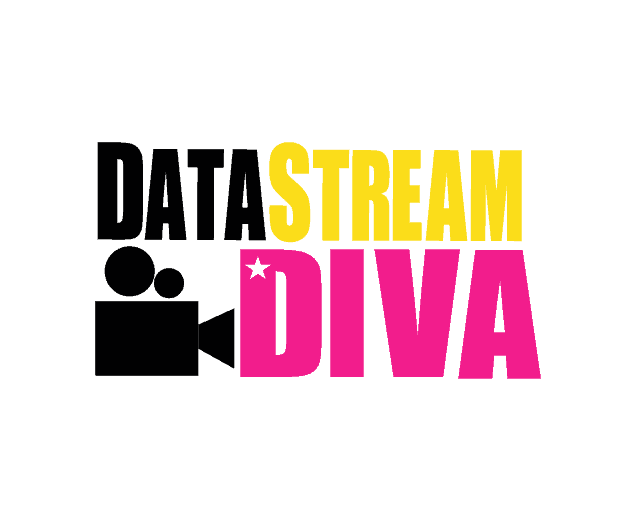- Beyond the Aquila Rift Explained: What The Ending Really Means - April 4, 2022
- Best Movies Like Paper Towns: Our Top Recommendations - April 4, 2022
- Best Movies Like Moana: Must-See for Disney Fans - March 4, 2022
Hulu launched in 2017 the show The Handmaid’s Tale, based on Margaret Atwood‘s gripping novel. Now it’s our duty to talk about this work of art and recommend some similar shows that we’ve chosen with all our heart, just for you.
The Handmaid’s Tale stars Elisabeth Moss, Joseph Fiennes, Samira Wiley, Max Minghella, Yvonne Strahovski, O-T Fagbenle, Alexis Bledel, Madeline Brewer, and Ann Dowd.
Adapted from Margaret Atwood’s novel, The Handmaid’s Tale, it’s the story of life in the Gilead dystopia. A totalitarian society where the United States used to exist. Ravaged by environmental disasters and a plummeting birth rate, Gilead is ruled by perverse fundamentalism that treats women as state property.
Offred (Elisabeth Moss), as one of the few remaining fertile women, is one of the maids in the Commander’s household and is part of the caste of women forced into sexual slavery as a last desperate attempt to repopulate a devastated planet.
In this terrifying society where any mistake can endanger her life, Offred desperately searches for the daughter who was taken from her, while trying to survive among commanders, their cruel wives, their fellow maids, and the women who control them. Anyone could be a government spy.
The power behind a brittle voice
A classic work of literature, showing us the dark reality of modernity
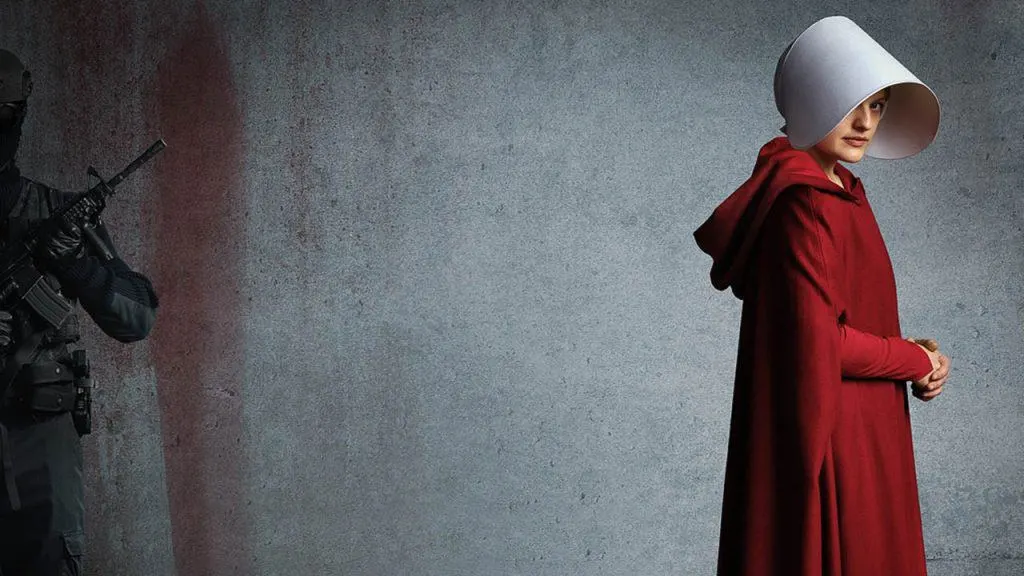
Bruce Miller (The 100) is the creator, screenwriter, and executive producer of this adaptation of the 1985 novel. Warren Littlefield (Fargo), Fran Sears, and Ilene Chaiken are also executive producers of this show produced and distributed internationally by MGM Television.
Hulu delivered the goods of this top-quality show for US streamers. The story captures you right from the start, where actress Elisabeth Moss plays Offred, a woman who finds herself trapped in a society with new values and rules, in which she is enslaved.
Through flashbacks, it becomes clear how she has arrived there, having radically changed her way of life. In order to survive, she must blindly obey and not express her ideas to anyone. Through voiceovers, Offred exposes her thoughts and tells part of the story.
The society that is presented seems to be a mixture of the Amish way of life, known mainly for its simple, traditional lifestyle, and that of the Islamic State, where women are second-class people, and non-compliance with the rules is severely punished. Opposing them are the Rebels, who want to reintroduce the lifestyle that existed before the environmental disasters.
Feminism emerges as a search for equality between men and women, it’s the opposition to a deep-rooted hierarchy that gives benefits and superiority to men over women. The Handmaid’s Tale presents us with a world in which feminism no longer exists, a world completely opposed to these ideas, where men are not only above women, but are the only authority.
Since it’s a dystopia, we can say that The Handmaid’s Tale is a call to feminism, a way to remember its importance and the value of equality between men and women.
After many years of fighting for women’s independence and rights, the women in The Handmaid’s Tale become slaves in a world they never believed could exist.
The Handmaid’s Tale’ is clearly a very dramatic show, in which we quickly empathize with the protagonist and feel the powerlessness of her situation, in which her decisions are the most correct to survive.
Even if it means accepting the horror of slavery, and blind obedience. It also shows us a possible pattern of the world, to which we are heading if we continue to devastate and pollute the planet.
Let’s talk about season 3
What is Offred’s future in Gilead? This and other questions are waiting to be answered. (Careful Spoilers)
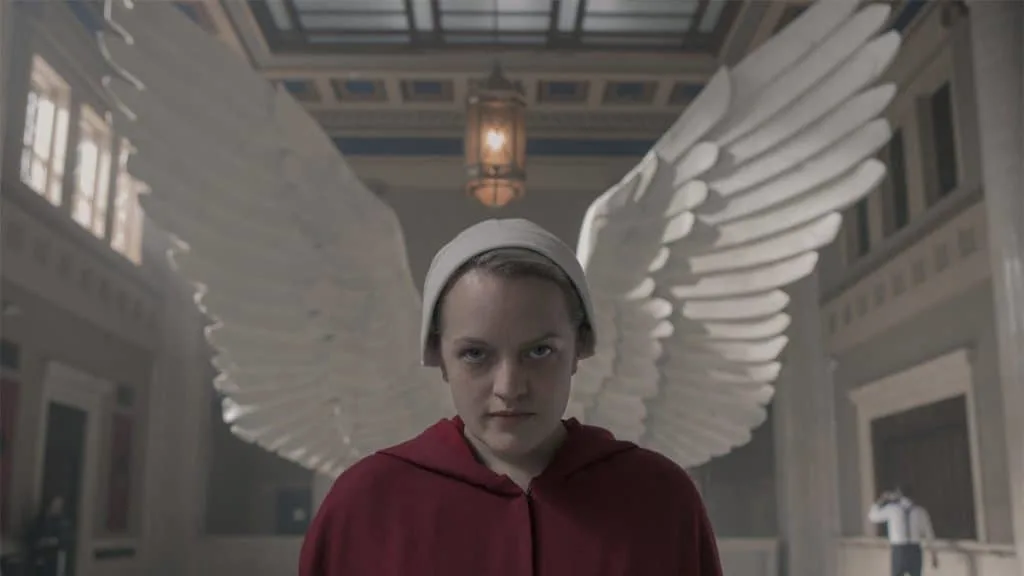
The third season of The Maid’s Tale has not lived up to its first two seasons.
Sorry for the bad news.
The show has reached a point where it has finished telling the events narrated in Margaret Atwood’s novel and this becomes noticeable in the plot’s development, which at times becomes boring and meaningless.
Offred’s character is becoming more powerful within Gilead, whose disrespect and continuous rebellious actions go unpunished and this contradicts what was told in previous seasons where every action outside the protocol had a punishment and nobody escaped from it.
Offred’s desperation leads her to devise a plan to smuggle more than 50 children out of Gilead. With the help of the Marthas, they get these children safely to Canada. We know that Offred won’t leave until she manages to find her daughter Hanah, and we’ll have to wait at least one more season.
The third season of The Handmaid’s Tale suffers, like many others, from stretching the plot more than it should. Although it’s true that the performance level continues to be excellent in all senses, we can’t ignore the point made above, which is that as they say, good things come in handy when they are twice as good.
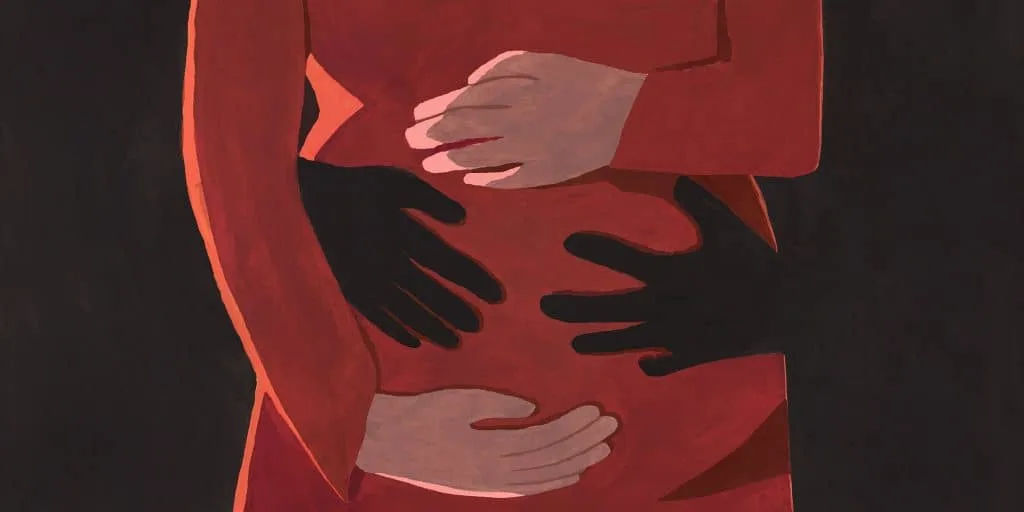
The Handmaid’s Tale is one of the few stories that not only revolutionize television but also our own perspective. Its profound realism enhances the social commentary of a society that is currently approaching the dangers that the show depicts.
But thank goodness that the world (for now) continues to provide us with shows that question our thoughts and philosophy. That’s why we had to list a few and give you that opportunity to discover more “beautiful” dystopian worlds, canned in shows of the highest order.
Black Mirror
A Jawbreak of Reality
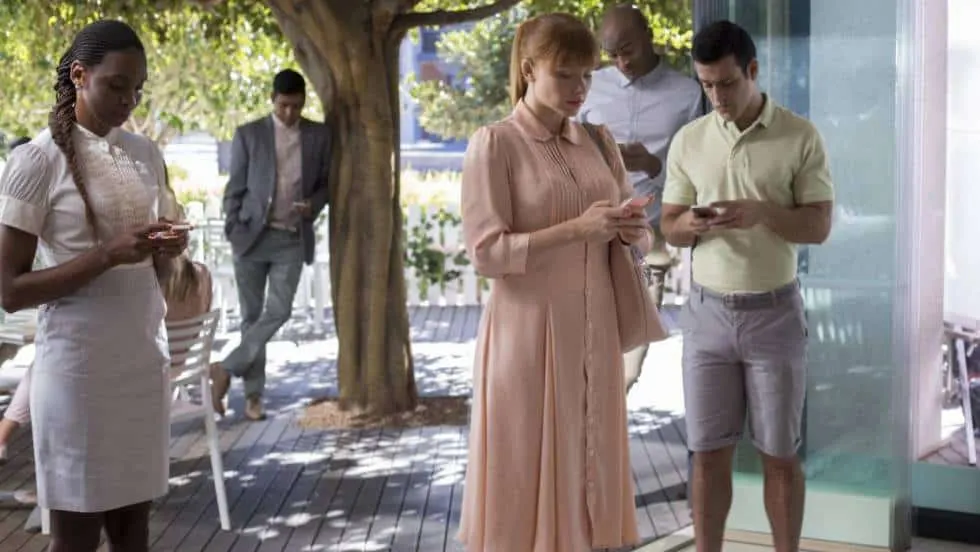
Indeed, the list of shows, movies, and books to watch is immense and increases proportionally to our cultural stress (call it first world drama). Watching seven seasons of twelve one-hour chapters each makes us lazy. But with Black Mirror there are no excuses.
Seasons of three and six self-concluding chapters of between 40 minutes and one hour, episodes without a plot continuity that are enjoyed both separately and in a serious marathon. But stories full of tension, anguish, doubts, fear, and reflection.
Black Mirror has been described by many as a masterpiece of television. Its format and style take a step forward and surprise us chapter after chapter. Each of its episodes shows with cruel originality the dangers of technology in society from different perspectives.
With this critical background, the different faces of a tragic world not far from ours are explored. Something that excites us as much as it irritates us.
As Hobbes’ homo homini lupus predicted, man is made to destroy himself. Existential nihilism gets a lot of attention nowadays, but here there is no need to get philosophical like Detective Rust Cohle in True Detective. Charlie Brooker and his Black Mirror show the dark side of humanity with more deeds and fewer words.
The stories revolve around a tortured human being in the face of the indifference of an oppressive, amoral, and merciless society. The only thing that changes are the tools with which to drive the victim insane. Little could Hobbes imagine that technology could do so much harm. It’s a hopeless song about the future and our erratic nature. Check out our list of best shows like Black Mirror here.
Westworld
The most terrifying attraction
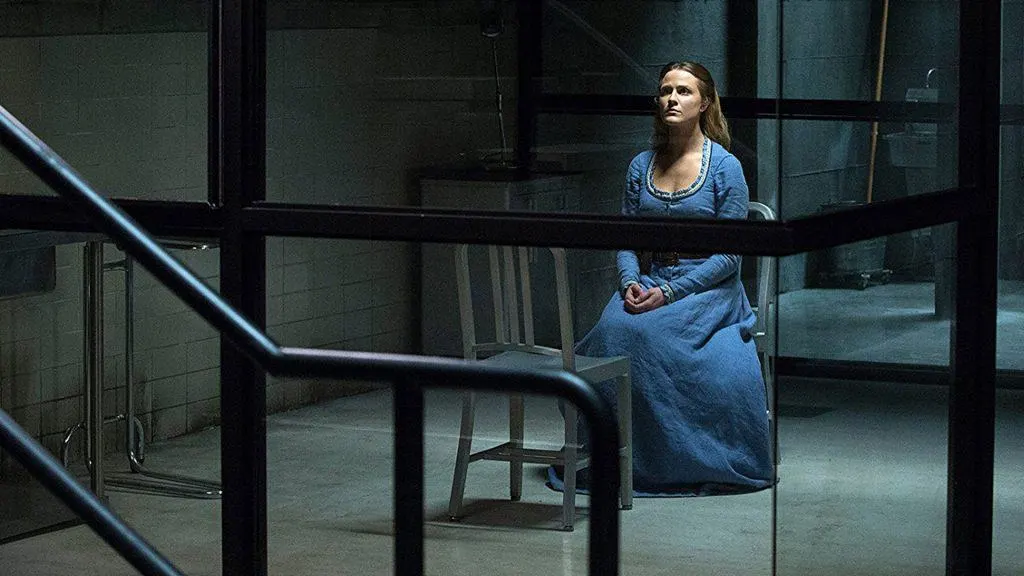
It was the most ambitious television bet in 2016. HBO, the network responsible for the resounding successes of Game of Thrones and True Detective (among many others), prepared the launch of Westworld very carefully. HBO’s most expensive project to date revolutionized America’s small screen. Again.
And it did so with a colossal story, an updated review by Jonathan Nolan and by none other than J.J. Abrams himself. Although he’s only in the production section.
Westworld arrived and with it, promising changes. A plot of intense, ambitious and complex magnitude and depth.
Westworld is the title given to the Old West amusement park. What’s so extraordinary about this? Everything seems real. Yes, even the people who populate the park and who give the show that originality (based on the 1973 film). But no, the people who appear in Westworld (or rather, who are within it) are not real.
They are robots. Artificial intelligence. Exact replicas of human beings, with defined personalities and with a story to play (a role) within that microcosm of the theme park.
However, as you can imagine if you have a certain background in science fiction, this type of sociological experiment does not usually go well. So Westworld is going to tell us what happens when men (and women) decide to play god with the tools they have.
Alias Grace
The dark side of inequality
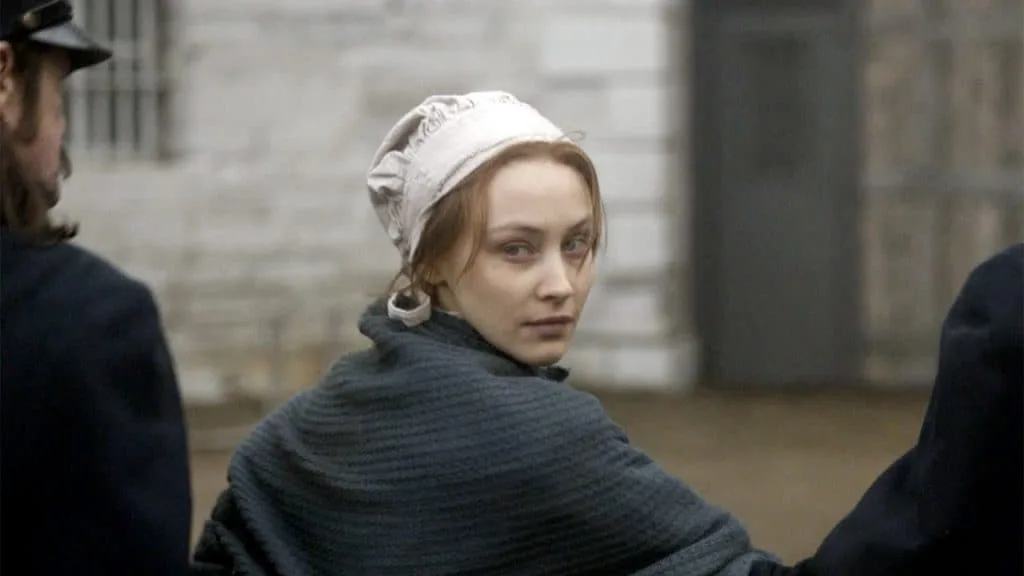
Alias Grace is the story of an enigma, which involves the figure of Grace Marks. The mini-series dives into how our public projection depends on the image that others build of us through what they believe to be the truth.
The protagonist of the show, also based on Margaret Atwood’s novel of the same name, has as many public portraits as people who think they know who she is, although the reality is that apprehending her essence is an impossible mission. Grace Marks can be everything the viewer thinks she is.
The show, which can be seen on Netflix, tells, partly, a true story, even if it’s partially hidden from us. Grace Marks was a young woman who came to Canada from the poorest and hungriest Ireland in the late 19th century. At only 16 years old she was tried and convicted of the murder of her master, Thomas Kinnear (Paul Gross), and his mistress, Nancy Montgomery (Anna Paquin), who was pregnant at the time.
From here, Atwood’s novel and its television adaptation, carried out by the actress Sarah Gadon, builds a story with fantastic tints that speaks of social and gender inequality. Atwood became interested in this story fascinated by the impossibility of determining Grace’s guilt or innocence. That’s why Jane Eyre‘s quote often comes to mind:
“Do you think that because I am poor, dark, simple and insignificant I have neither soul nor heart.”
The urge to compare Alias Grace with The Handmaid’s Tale is hard to overcome. The fact that they share an author makes the viewer establish connections even without meaning to.
Anyone who expects to see a second part of the fiction starring Elisabeth Moss will be slightly disappointed: Alias Grace has an entity of its own, although perhaps it lacks a little of the visual and plot intensity of Hulu’s series.
Top of the Lake
For our heroines’ fans
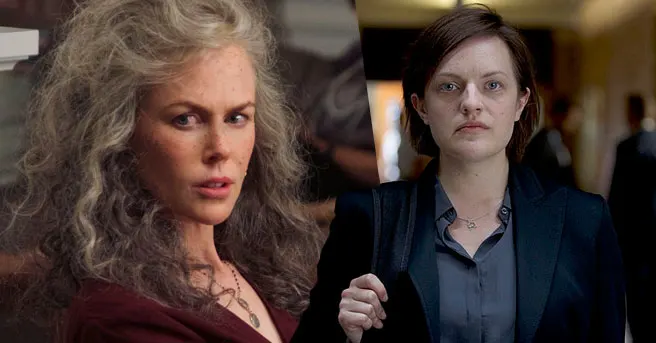
A year before the first season of True Detective came to HBO and bewitched us all with its photography, its dark tone, with the mysticism of Matthew McConaughey‘s character or with its headline, The Fall and Top of The Lake had been released, two detective series that rewrote the genre’s clichés.
Top of The Lake is visual poetry with our beloved Elisabeth Moss in the lead role, supported by Nicole Kidman and Jane Champion as its creator. And all this adds up to a show that really speaks for itself.
Robin Griffin (Elisabeth Moss) is an Australian detective specializing in cases of sexual violence who, while visiting her sick mother in Laketop, a small town in southern New Zealand, must take over the investigation of the case of Tui Mitcham, a 12-year-old girl who is pregnant and disappears without a trace.
Throughout the seven episodes (seven in the international version and six in the British one) of the first season, Robin will confront the hegemonic masculinity of the people, not only that of the patriarch of the
Mitcham, a family whose corruption and power are not limited to its criminal activities, but also present in the sexist culture and the corruption of the police system.
Because the Laketop community has been founded on rotten quicksand that has allowed the normalization of behaviors to which everyone has decided to look the other way.
F.A.Q
Martha: Women who become Martha must serve the family in whatever way is necessary. They tend to be ethnic minority women, with a low social profile, unmarried, and probably infertile. If a Martha lives longer than her ‘bosses’, she will be sent to the colonies.
After carrying out a military coup assassinating the president and attributing these attacks to Islamic terrorism, some theocratic politicians came to power in the United States, which was renamed the Republic of Gilead (from Gilead, to refer to the political organization of the work).
The fourth is on its way (although it was delayed to 2021). Miller had previously contemplated writing the show in seven seasons.
The states that belong to the Republic of Gilead are Massachusetts, Rhode Island, Connecticut, New York, New Jersey, Maryland, Delaware, Pennsylvania, Virginia, North Carolina, Tennessee, West Virginia, Kentucky, Indiana, Ohio, Columbia, and Wisconsin.
The third season has 13 episodes, and the next one is confirmed to have 10.
Brief Summary
Hey, look… life isn’t so dark, negative, and dramatic either. A dystopian world is still (hopefully) far away and we have to value the works of art as they are.
The wonderful thing is that these few shows, and in this case especially The Handmaid’s Tale, have had the courage to capture a different side of the fanciful world of the shows.
You could say that we’re pretty much attacked many times by shows and movies that just want the opposite; which is to turn off our brains in order to simply have a good time. And that’s why it’s so important to have shows that highlight philosophy and undress the prejudices we carry within us.
The Handmaid’s Tale is fascinating in all its aspects thanks to the wonderful Margaret Atwood and the creative team that defends the show from head to toe. Thanks to all of them, we are all Offred.
